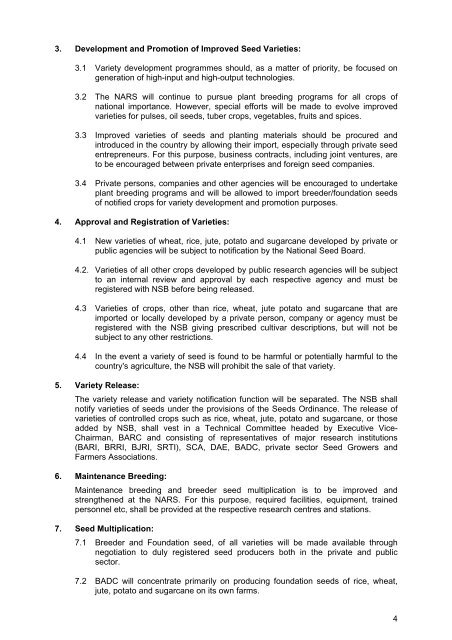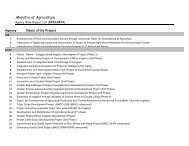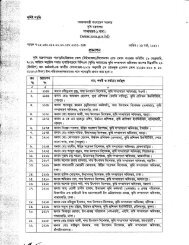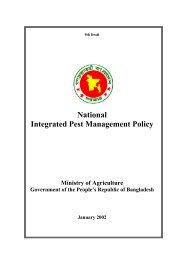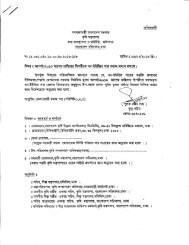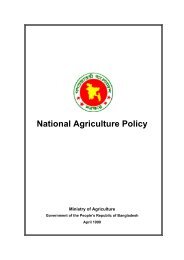The National Seed Policy - DAE
The National Seed Policy - DAE
The National Seed Policy - DAE
You also want an ePaper? Increase the reach of your titles
YUMPU automatically turns print PDFs into web optimized ePapers that Google loves.
3. Development and Promotion of Improved <strong>Seed</strong> Varieties:<br />
3.1 Variety development programmes should, as a matter of priority, be focused on<br />
generation of high-input and high-output technologies.<br />
3.2 <strong>The</strong> NARS will continue to pursue plant breeding programs for all crops of<br />
national importance. However, special efforts will be made to evolve improved<br />
varieties for pulses, oil seeds, tuber crops, vegetables, fruits and spices.<br />
3.3 Improved varieties of seeds and planting materials should be procured and<br />
introduced in the country by allowing their import, especially through private seed<br />
entrepreneurs. For this purpose, business contracts, including joint ventures, are<br />
to be encouraged between private enterprises and foreign seed companies.<br />
3.4 Private persons, companies and other agencies will be encouraged to undertake<br />
plant breeding programs and will be allowed to import breeder/foundation seeds<br />
of notified crops for variety development and promotion purposes.<br />
4. Approval and Registration of Varieties:<br />
4.1 New varieties of wheat, rice, jute, potato and sugarcane developed by private or<br />
public agencies will be subject to notification by the <strong>National</strong> <strong>Seed</strong> Board.<br />
4.2. Varieties of all other crops developed by public research agencies will be subject<br />
to an internal review and approval by each respective agency and must be<br />
registered with NSB before being released.<br />
4.3 Varieties of crops, other than rice, wheat, jute potato and sugarcane that are<br />
imported or locally developed by a private person, company or agency must be<br />
registered with the NSB giving prescribed cultivar descriptions, but will not be<br />
subject to any other restrictions.<br />
4.4 In the event a variety of seed is found to be harmful or potentially harmful to the<br />
country's agriculture, the NSB will prohibit the sale of that variety.<br />
5. Variety Release:<br />
<strong>The</strong> variety release and variety notification function will be separated. <strong>The</strong> NSB shall<br />
notify varieties of seeds under the provisions of the <strong>Seed</strong>s Ordinance. <strong>The</strong> release of<br />
varieties of controlled crops such as rice, wheat, jute, potato and sugarcane, or those<br />
added by NSB, shall vest in a Technical Committee headed by Executive Vice-<br />
Chairman, BARC and consisting of representatives of major research institutions<br />
(BARI, BRRI, BJRI, SRTI), SCA, <strong>DAE</strong>, BADC, private sector <strong>Seed</strong> Growers and<br />
Farmers Associations.<br />
6. Maintenance Breeding:<br />
Maintenance breeding and breeder seed multiplication is to be improved and<br />
strengthened at the NARS. For this purpose, required facilities, equipment, trained<br />
personnel etc, shall be provided at the respective research centres and stations.<br />
7. <strong>Seed</strong> Multiplication:<br />
7.1 Breeder and Foundation seed, of all varieties will be made available through<br />
negotiation to duly registered seed producers both in the private and public<br />
sector.<br />
7.2 BADC will concentrate primarily on producing foundation seeds of rice, wheat,<br />
jute, potato and sugarcane on its own farms.<br />
4


